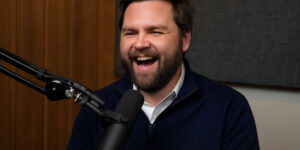In ‘Living Biblically,’ I Laughed and Cringed; Here’s Why
Television is producing more shows with religious themes, as the sitcom Living Biblically illustrates. The show depicts a lapsed Catholic who is married to an atheist and decides to live by the literal commands of Scripture with the help of a Jewish rabbi and a Catholic priest. I found it mildly humorous at times, cringe-worthy at others.
Other religiously themed shows include a young man preparing for his bar mitzvah, a young genius who struggles with his mother’s Christianity, and a stand-up comic who wrestles with his faith.
What they seem to have in common is this: they treat Christianity as a religion more than a relationship.
“That’s easy-it’s grace”
In What’s So Amazing About Grace?, Philip Yancey describes a conference on comparative religions in which experts were discussing whether any specific belief was unique to Christianity.
The debate went on for some time, until C. S. Lewis wandered into the room. “What’s the rumpus about?” he asked. He was told that his colleagues were discussing Christianity’s unique contribution among the world’s religions. Lewis responded: “Oh, that’s easy. It’s grace.”
When we focus on the grace-centered, intimate communion we can have with God Almighty, those who don’t understand may mock us for listening to our Father’s voice. Recall Joy Behar’s claim on The View that Mike Pence, who claims to hear God’s voice, has a “mental illness.”
As Eric Metaxas notes, “If Mike Pence is crazy for believing he hears God’s voice, then so are George Washington, Abraham Lincoln, FDR, Jimmy Carter, Bill Clinton, and Barack Obama—all of whom said they listened for the still, small voice of God.”
The good news is that some in Hollywood really understand the good news.
For instance, Letitia Wright, who plays Princess Shuri in Black Panther, told an interviewer that a few years ago, “I was pretty much obsessed with acting, and it became my world. It became what I used to be happy.” So she went on a hiatus from acting: “I said, ‘Okay, Jesus, I’ll try you,’ and I haven’t looked back since.”
Now, she says, “I don’t really consider myself religious. I view it more as a relationship. And if anyone thinks that’s weird, then OK.”
When We Work, God Works
How can you and I build a more transforming, empowering relationship with the Lord of the universe?
Our self-reliant culture would expect me to encourage more church attendance, Bible reading, time in prayer, and other spiritual activities as the answer to the question. The brilliant theologian Henri Nouwen agreed that such disciplines are vital: “Discipline is the other side of discipleship. Discipleship without discipline is like waiting to run in the marathon without ever practicing. Discipline without discipleship is like always practicing for the marathon but never participating.”
Then comes the grace-centered surprise: “It is important, however, to realize that discipline in the spiritual life is not the same as discipline in sports. Discipline in sports is the concentrated effort to master the body so that it can obey the mind better. Discipline in the spiritual life is the concentrated effort to create the space and time where God can become our master and where we can respond freely to God’s guidance.
“Thus, discipline is the creation of boundaries that keep time and space open for God. Solitude requires discipline, worship requires discipline, caring for others requires discipline. They all ask us to set apart a time and a place where God’s gracious presence can be acknowledged and responded to.”
Said simply: When we work, God works. When we make time for God, we position ourselves to receive what his grace intends to provide. We cannot earn what he can only give. But we must be close enough to receive what he wants to bestow.
‘O Lord, Do It Again!’
Jesus said, “My sheep hear my voice, and I know them, and they follow me” (John 10:27). His Father promised us, “Call to Me, and I will answer you, and show you great and mighty things which you do not know” (Jer. 33:3). Our Savior added: “He who is of God hears God’s words” (John 8:47).
But know this: after God speaks to us, he intends to speak through us.
Yesterday, I reflected on Mark Batterson’s terrific new book, Whisper: How to Hear the Voice of God. I’ll close today with my favorite story from the book:
“In 1940, Dr. J. Edwin Orr took a group of Wheaton College students to study abroad in England. One of their stops included the Epworth Rectory. The rectory now serves as a Methodist museum, but it was the home of John Wesley, the founder of the Methodist movement.
“In one of the bedrooms, there are two impressions where it is believed that John Wesley regularly knelt in prayer. As the students were getting back on the bus, Dr. Orr noticed that one student was missing. Going back upstairs, Dr. Orr found a young Billy Graham kneeling in those kneeholes and praying, ‘O Lord, do it again!'”
Now it’s our turn.



























































